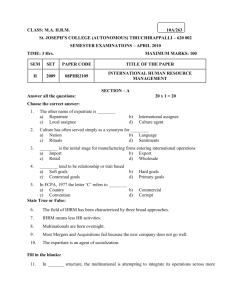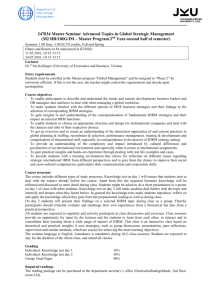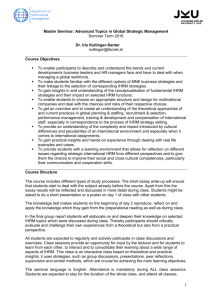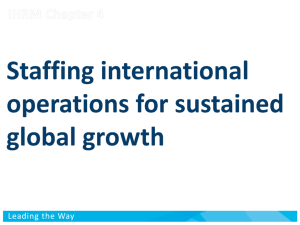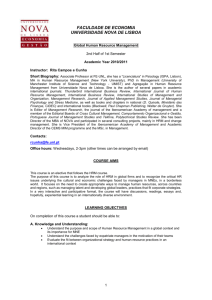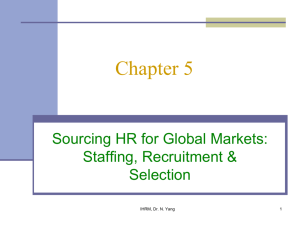4. Staffing International Operations for Sustained Global Growth.
advertisement
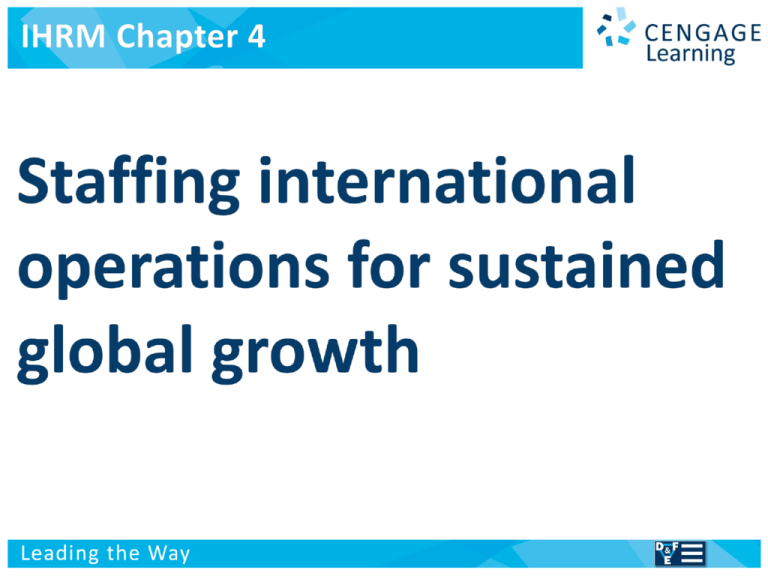
International Human Resource Management Managing people in a multinational context Chapter Objectives We focus on the ‘managing the people’ aspect of IHRM: • Issues relating to staffing foreign operations • The reasons for using international assignments: filling positions and developing managers and organizations. • Various types of international assignments: short term, extended and longer term; • Various non-standard arrangements: commuter, rotator, contractual and virtual • The role of expatriates and non-expatriates in supporting international business activities • Return on investment of international assignments • The role of the corporate HR function in MNEs v IHRM Chapter 4 2 Terms Expatriate roles: Assignments: short-term extended agent of direct control traditional agent of socialization commuter language node ROI approach rotational network builder contractual virtual boundary spanner inpatriates expatriates flexpatriates v IHRM Chapter 4 Approaches to staffing: ethnocentric polycentric geocentric regiocentric 3 Table 4-1a v The advantages and disadvantages of using PCNs IHRM Chapter 4 4 Table 4-1b v The advantages and disadvantages of using TCNs IHRM Chapter 4 5 Table 4-1c v The advantages and disadvantages of using HCNs IHRM Chapter 4 6 Figure 4-1 v Determinants of staffing choices IHRM Chapter 4 7 Reasons for International Assignments 1. Position filling 2. Management development 3. Organization development v IHRM Chapter 4 8 Types of international assignments • • • Short term up to 3months Extended up to 1year Long term (traditional expatriate assignment) 1 to 5 years Some non-standard assignments: • Commuter go home every one to two weeks • Rotational commute for set period followed by break in home country • Contractual specific skills employees hired for 6 to 12 months on specific projects • Virtual employee manages international responsibilities from home country base v IHRM Chapter 4 9 Table 4-2 v Differences between traditional and short-term assignments IHRM Chapter 4 10 Figure 4-2 v The roles of an expatriate IHRM Chapter 4 11 Figure 4-3 v ROI indicators for calculating international assignments IHRM Chapter 4 12 4-steps to calculate expatriate ROI 1. Identify financial and non-financial costs and benefits. 2. Link the costs and benefits to the purpose of the long-term assignment. 3. Identify the appropriate antecedents from a system’s perspective. 4. Conduct the calculation at an appropriate time within the context of the assignment’s purpose. v IHRM Chapter 4 13 Table 4-3 v Various roles of corporate HR IHRM Chapter 4 14 Discussion Questions 1. Outline the main characteristics of the four approaches to international staffing. 2. Which factors determine the choice of a staffing approach? Would a MNE choose the same staffing approach worldwide? Place your arguments in the context of the model outlining determinants of staffing choices. 3. What are the reasons for using international assignments? 4. What is the role of inpatriates? Do inpatriates guarantee a geocentric staffing policy? 5. Why is it important to measure return on investment of international assignments? Which indicators can be used? 6. As a newly appointed Project Manager of a research team, you consider that you will be able to manage the project virtually from your office in London, even though the other six members are located in Munich. This will solve your personal dilemma as your family does not want to be relocated. The project has a six-month deadline. What factors should you need to consider in order to make this virtual assignment effective? v IHRM Chapter 4 15
